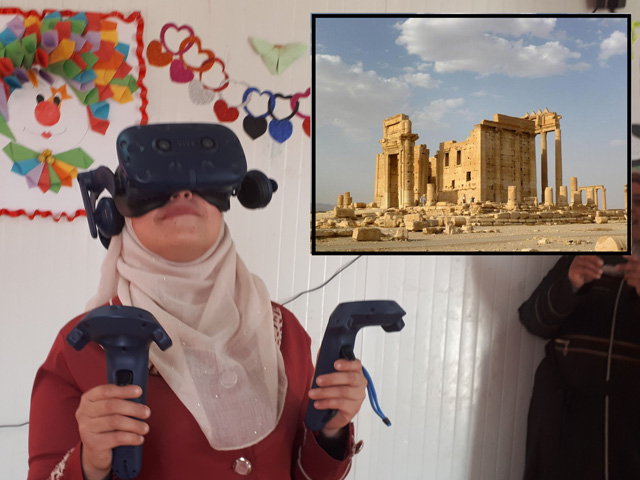Augmenting Jordanian Heritage/BReaTHe
Fragmented Heritage spans a number of projects that address heritage conservation and reconstruction, both virtual and real, ground-breaking use of citizen science and crowdsourcing of images, capacity-building in the world heritage and tourism sectors and contributions to social cohesion among displaced people. These projects include Augmenting Jordanian Heritage and BReaTHe.
Augmenting Jordanian Heritage was developed to transfer knowledge from within the Fragmented Heritage project and build capacity in the heritage and tourism sector in Jordan. This supported the creation of an asset bank of valuable Jordanian artefacts and sites, explored the use of virtual-reality and augmented museum display for dissemination, provided high-level training in the use of digital heritage techniques and approaches, and has left a legacy of capacity with the Jordan Museum to build digital heritage in the region.

The project successfully managed to scan some of the most important objects among the collection of the Jordan Museum….The Jordan Museum integrated these scans within the physical exhibitions by displaying it next to some of the most popular objects (like the Dead Sea Scrolls, Ain Ghazal statues, the Altar from Pella, etc). These scans were eye-catching spots in the exhibitions which enabled visitors to “digitally touch” the objects…
Director of Science and Technology, The Jordan Museum
BReaTHe
Building on the success of this and other Fragmented Heritage projects, the School partnered with Mercy Corps (in co-operation with ISHRAK Programme in Azraq Camp), Southern Azraq Women Association and Jordan Heritage to create The BReaTHe Project – Building Resilience Wellbeing and Cohesion in Displaced Societies Using Digital Heritage.
The project harnesses the potential of digital heritage to foster social cohesion, wellbeing and peacebuilding in displaced and conflict-affected communities in Jordan. The project held workshops with representatives from across the community, to identify the heritage they valued, to be recreated through virtual reality. These sites were showcased in Cultural Heritage Festivals in Azraq Camp and Azraq Town, which included celebrations of food, music, dance, stories, artwork and photographs.
Drawing from the Curious Travellers methodology to repurpose web-scraped images into 3D models and using immersive virtual reality techniques it has been possible to allow refugee and other mixed communities to access heritage that, either through displacement or destruction, is no longer available to them. Access was supported through psychosocial support, to ensure wellbeing and safety.
This digital heritage helped to reconnect people and stimulated discussion between Syrian, Druze, Bedouin and Chechen people as well as other minority groups, in an environment affected by tension, stress and feelings of isolation.
These engagements and discussions stimulated and encouraged people to build relationships, explore diversity as fundamental to understanding heritage, and in doing so make connections and develop resilience. The project has also encouraged younger people with fragmented or even negative memories of their past to connect and engage with the wider legacy of their communities, leading to a sense of belonging, social cohesion and greater self-confidence, including prompting inter-generational communication.
The work has transformed the ability for the effective leadership of a community and caused a change in social structure that has significantly improved the quality of life within the refugee camps.
My daughter was little when she left Syria, since the VR she has started remembering and talking about Syria, I had no idea she could remember so much.
We considered Azraq Refugee camp as a prison and living in the fenced area of Village 5 is like living in a prison inside a prison. We can’t go outside to see the world, but through the VR, you brought the world to us.
Refugees in Azraq Camp, Jordan
The project has very clearly united previously disparate culturally varied pockets of populations in the town…it has helped greatly in the coordination of administrative efforts to improve community spirit.
Mayor of Azraq Township, Jordan
